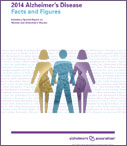| 2014 Alzheimer's Disease Facts and Figures Shows Disproportionate Impact on Women
 Nearly two-thirds of those living with Alzheimer’s disease – or 3.2 million people – are women. Women in their 60s are about twice as likely to develop Alzheimer’s disease over the rest of their lives as they are to develop breast cancer. And, women comprise over 60 percent of the unpaid caregivers for those with Alzheimer’s disease. These findings are included in the Alzheimer’s Association’s 2014 Alzheimer’s Disease Facts and Figures, which was released yesterday. In addition to detailing the growing prevalence and escalating impact of Alzheimer’s on individuals, caregivers, families, and the nation’s health care system, this year’s edition of the annual report includes a special section on the disproportionate impact that Alzheimer’s disease has on women. Nearly two-thirds of those living with Alzheimer’s disease – or 3.2 million people – are women. Women in their 60s are about twice as likely to develop Alzheimer’s disease over the rest of their lives as they are to develop breast cancer. And, women comprise over 60 percent of the unpaid caregivers for those with Alzheimer’s disease. These findings are included in the Alzheimer’s Association’s 2014 Alzheimer’s Disease Facts and Figures, which was released yesterday. In addition to detailing the growing prevalence and escalating impact of Alzheimer’s on individuals, caregivers, families, and the nation’s health care system, this year’s edition of the annual report includes a special section on the disproportionate impact that Alzheimer’s disease has on women.
Among the other findings of the report:
•There are an estimated 5.2 million Americans living with Alzheimer’s disease, including 200,000 people under age 65. By 2050, as many as 16 million people could have Alzheimer’s.
•About half of those with Alzheimer’s disease and other dementias have not been diagnosed.
•One in three seniors dies with Alzheimer’s or another dementia. In 2014, an estimated 700,000 seniors in the United States will die with Alzheimer’s.
•In 2014, the direct costs of caring for those with Alzheimer’s and other dementias will total an estimated $214 billion, including $150 billion in costs to Medicare and Medicaid.
•Alzheimer’s drives up the costs of other chronic conditions. For example, the average Medicare costs for seniors with diabetes and Alzheimer’s or another dementia are 81 percent higher than seniors with diabetes but no Alzheimer’s or dementia; for Medicare beneficiaries with heart disease, costs are 61 percent higher.
•In 2013, 15.5 million caregivers provided an estimated 17.7 billion hours of unpaid care to people with Alzheimer’s and other dementias, a contribution to the nation valued at more than $220 billion.
•Alzheimer’s and dementia caregivers had $9.3 billion in additional health care costs in 2013 due to the physical and emotional toll of caregiving.
For more information on the 2014 Alzheimer’s Disease Facts and Figures report, including Alzheimer’s statistics for your state, visit alz.org/facts.
Study Suggests Deaths Attributable to Alzheimer’s Far Exceed Official Mortality Reports
 In 2010, more than 500,000 deaths in the United States were attributable to Alzheimer’s disease, according to an article in the March 5 issue of Neurology. Researchers from Rush University estimated that Alzheimer’s disease played some role in the deaths of 500,000 Americans that year. While Alzheimer’s was not necessarily the cause of death in all of these cases, this latest study suggests what has been found in several previous studies: deaths from Alzheimer’s are under-reported as the official cause of deaths on death certificates. And, it indicates that the impact Alzheimer’s has is far greater than the official mortality numbers indicate. In 2010, more than 500,000 deaths in the United States were attributable to Alzheimer’s disease, according to an article in the March 5 issue of Neurology. Researchers from Rush University estimated that Alzheimer’s disease played some role in the deaths of 500,000 Americans that year. While Alzheimer’s was not necessarily the cause of death in all of these cases, this latest study suggests what has been found in several previous studies: deaths from Alzheimer’s are under-reported as the official cause of deaths on death certificates. And, it indicates that the impact Alzheimer’s has is far greater than the official mortality numbers indicate.
Blood-Based Biomarker May Help Predict Preclinical Alzheimer’s Disease
 A new blood-based biomarker predicts preclinical Alzheimer’s with 90 percent accuracy, according to preliminary results of a new study published in the March 9 issue of Nature Medicine. According to the researchers, the test was able to distinguish between two distinct groups: (1) cognitively normal participants who would progress to mild cognitive impairment (MCI) or Alzheimer’s within two to three years, and (2) those who would remain normal in the near future. If the intriguing results of this study can be validated with additional study, it would be a significant advancement in early detection and diagnosis efforts. Blood-based biomarkers are more accessible, less invasive, easier to gather, and less expensive to process than existing biomarkers, such as testing levels of abnormal proteins in cerebrospinal fluid and brain PET amyloid plaque imaging. A new blood-based biomarker predicts preclinical Alzheimer’s with 90 percent accuracy, according to preliminary results of a new study published in the March 9 issue of Nature Medicine. According to the researchers, the test was able to distinguish between two distinct groups: (1) cognitively normal participants who would progress to mild cognitive impairment (MCI) or Alzheimer’s within two to three years, and (2) those who would remain normal in the near future. If the intriguing results of this study can be validated with additional study, it would be a significant advancement in early detection and diagnosis efforts. Blood-based biomarkers are more accessible, less invasive, easier to gather, and less expensive to process than existing biomarkers, such as testing levels of abnormal proteins in cerebrospinal fluid and brain PET amyloid plaque imaging.
Road Map Discussed at American Society on Aging Conference
 The Public Health Road Map was the subject of a workshop at last week’s American Society on Aging (ASA) conference in San Diego. Organized by Angela Deokar of the CDC’s Healthy Aging Program, the session focused on how the aging and public health communities can work together to address cognitive health and Alzheimer’s disease through the implementation of the Road Map. Deokar laid the groundwork by discussing how and why the Road Map was developed. Bill Benson of Health Benefits ABCs reviewed the history of collaboration between the aging network and public health – and how the Road Map can fit into those efforts. And, Matthew Baumgart of the Alzheimer’s Association shared how the Association is working around the country to engage public health officials in the fight against Alzheimer’s. The Public Health Road Map was the subject of a workshop at last week’s American Society on Aging (ASA) conference in San Diego. Organized by Angela Deokar of the CDC’s Healthy Aging Program, the session focused on how the aging and public health communities can work together to address cognitive health and Alzheimer’s disease through the implementation of the Road Map. Deokar laid the groundwork by discussing how and why the Road Map was developed. Bill Benson of Health Benefits ABCs reviewed the history of collaboration between the aging network and public health – and how the Road Map can fit into those efforts. And, Matthew Baumgart of the Alzheimer’s Association shared how the Association is working around the country to engage public health officials in the fight against Alzheimer’s.
The Alzheimer’s Public Health E-News is supported by Cooperative Agreement #5U58DP002945-04 from the Centers for Disease Control and Prevention (CDC). Its contents are solely the responsibility of the Alzheimer’s Association and do not necessarily represent the official views of the CDC.
|